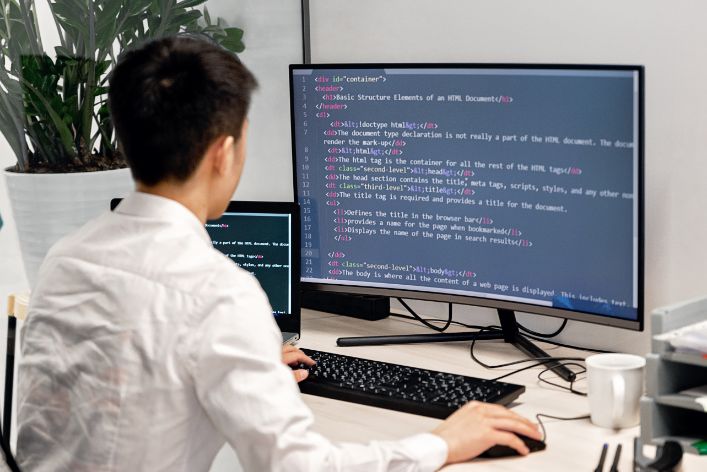Last Updated on May 9, 2023
Coding is the process of writing instructions for a computer to perform a specific task. It involves using programming languages to create software, websites, and apps that we use every day. In today’s digital age, coding is an increasingly important skill to have, regardless of your industry or profession.
Learning to code provides you with the ability to create, innovate, and solve problems in ways that were once impossible. It can also lead to higher-paying job opportunities and greater job security. As more companies move their operations online, the demand for skilled programmers continues to grow.
In this blog post, we’ll cover the basics of coding, including how to choose a programming language, learn the fundamentals, and develop good coding habits. We’ll also discuss the importance of building a portfolio and continuing your education to stay up-to-date with the latest trends and advancements in the field.

Whether you’re a complete beginner or have dabbled in coding before, this blog post will provide you with the tools and resources you need to kickstart your programming journey. By the end of this post, you’ll have a solid understanding of the fundamentals of coding and be well on your way to creating your own programs and applications. So, let’s get started!
Choosing a language
When it comes to learning to code, choosing the right programming language is a critical first step. With so many options available, it can be overwhelming to know where to start. In this chapter, we’ll provide an overview of some popular programming languages, factors to consider when choosing a language, and recommended languages for beginners.
Overview of some popular programming languages
First, let’s take a look at some popular programming languages:
- Python – a versatile language used in a variety of applications, including web development, data analysis, and artificial intelligence.
- Java – a widely-used language in enterprise and Android app development.
- JavaScript – a language used to create interactive web applications.
- C++ – a powerful language often used in systems programming and game development.
- Ruby – a language used for web development and popular for its ease of use.
Factors to consider when choosing a language
When choosing a programming language, there are several factors to consider:
- Purpose – What do you want to build with the language? Different languages are better suited for different applications.
- Difficulty – Some languages are more challenging to learn than others, so it’s important to choose a language that matches your skill level.
- Community – A strong community of developers can provide support and resources for learning and problem-solving.
- Job prospects – Some languages are in higher demand than others, so if your goal is to land a job as a programmer, it’s worth considering which languages are most sought-after by employers.
Recommended languages for beginners
For beginners, we recommend starting with a language that is easy to learn and widely used. Here are three languages that fit the bill:
- Python/PHP – With its simple syntax and a large community of developers, Python/PHP is an excellent language for beginners. It’s used in a variety of applications, from data analysis to web development.
- JavaScript – As the language of the web, JavaScript is a must-learn for anyone interested in front-end web development. It’s relatively easy to learn and widely used.
- Ruby – Known for its ease of use and readability, Ruby is a great language for beginners. It’s used in web development and has a supportive community of developers.
Choosing the right programming language is an important first step in your coding journey. Consider the purpose, difficulty, community, and job prospects when making your decision. For beginners, we recommend starting with Python, PHP, JavaScript, or Ruby. Once you’ve chosen your language, it’s time to start learning the fundamentals.
Read: 7 Tech Jobs That Do Not Require Coding Skills
Learning the basics
Now that you’ve chosen your programming language, it’s time to dive into the basics. In this chapter, we’ll cover the fundamental concepts you’ll need to master to become a proficient programmer. Specifically, we’ll discuss understanding data types and variables, control structures, functions and objects, and resources for learning the basics.
Understanding data types and variables
Data types and variables are essential building blocks in programming. Data types refer to the different types of data that can be stored in a program, such as numbers, strings, and booleans. Variables, on the other hand, are used to store and manipulate data within a program. Understanding these concepts is crucial to writing effective code.
Control structures (if/else statements, loops)
Control structures are used to direct the flow of a program. If/else statements allow you to execute different codes based on certain conditions, while loops allow you to repeat a section of code until a condition is met. These structures provide powerful tools for creating complex programs.
Functions and objects
Functions and objects are two essential concepts in programming. A function is a block of code that performs a specific task, while an object is a collection of data and functions that represent a real-world entity. Understanding how to create and use functions and objects is crucial to building complex programs.
Resources for learning the basics
There are many resources available for learning the basics of programming. Online courses, tutorials, and coding bootcamps are all excellent options for beginners. Many programming languages also have their own official documentation, which can provide valuable insights into the language’s syntax and functionality.
One of the most important things you can do as a beginner programmer is to practice writing code. Start with simple programs and work your way up to more complex ones. Don’t be afraid to make mistakes – they’re an essential part of the learning process.
Understanding the basics of programming is essential to becoming a proficient programmer. Data types and variables, control structures, functions, and objects are all fundamental concepts that you’ll need to master. There are many resources available for learning the basics, but the most important thing is to practice writing code. With time and dedication, you’ll be well on your way to becoming a skilled programmer.
Getting your hands dirty
Learning the basics of programming is just the beginning. To become a proficient programmer, you need to get your hands dirty and start writing code. In this chapter, we’ll discuss three ways to do just that: practice exercises, building simple programs, and finding open source projects to contribute to.
Practice exercises to reinforce what you’ve learned
Practice exercises are a great way to reinforce what you’ve learned. Many online resources offer practice exercises that allow you to apply the concepts you’ve learned in a practical way. These exercises can help you gain confidence in your programming skills and identify areas that need improvement.
Building simple programs
Building simple programs is another way to hone your programming skills. Start with a basic program that performs a simple task and work your way up to more complex programs. As you build more programs, you’ll gain a deeper understanding of how different programming concepts work together.
Finding open source projects to contribute to
Contributing to open source projects is an excellent way to gain real-world experience as a programmer. Open source projects are projects that are publicly available for anyone to contribute to. Contributing to these projects can help you develop your programming skills, build your portfolio, and connect with other developers.
When looking for open source projects to contribute to, consider projects that align with your interests and skill level. Many open source projects have documentation for new contributors, making it easy to get started. You can also look for open source projects on websites like GitHub or GitLab.
Overall, getting your hands dirty is essential to becoming a proficient programmer. Practice exercises, building simple programs, and contributing to open source projects are all excellent ways to develop your programming skills. Don’t be afraid to make mistakes – they’re an essential part of the learning process. With time and dedication, you’ll be well on your way to becoming a skilled programmer.
Read: How To Get Started With Coding and Programming: A Beginner’s Guide
Developing good habits
Developing good habits as a programmer is crucial to writing efficient and maintainable code. In this chapter, we’ll discuss four habits that can help you become a better programmer: commenting on your code, using version control systems, code organization, and best practices, and learning from others’ code.
Importance of commenting your code
Commenting on your code is a simple but essential habit for any programmer. Comments are notes that you add to your code to explain what it does and how it works. They can help you and others understand your code more easily and can make it easier to maintain in the future.
Using version control systems
Version control systems, such as Git, allow you to track changes to your code over time. Using a version control system can help you keep track of changes to your code, collaborate with others, and revert changes if something goes wrong. It’s an essential habit for any programmer, whether you’re working alone or as part of a team.
Code organization and best practices
Code organization and best practices are essential habits for writing maintainable code. By organizing your code into logical sections and following best practices for naming conventions, indentation, and other formatting, you can make your code more readable and easier to maintain in the long run.
Learning from others’ code
Learning from others’ code is an excellent habit for any programmer. By studying other people’s code, you can learn new programming techniques, see how different programming concepts work together, and gain insights into best practices for writing efficient code. You can find code to study on sites like GitHub, or by collaborating with other developers.
In summary, developing good habits as a programmer is essential to writing efficient and maintainable code. Commenting your code, using version control systems, following code organization and best practices, and learning from others’ code are all habits that can help you become a better programmer. By making these habits a regular part of your programming practice, you’ll be well on your way to writing high-quality code that is easy to maintain and build upon.
Read: How to Transition from a Creator to a Tech StartUp Founder
Building a portfolio
As a programmer, building a portfolio is essential to showcasing your skills and landing job opportunities. In this chapter, we’ll discuss the importance of having a portfolio, ideas for projects to showcase your skills, and platforms to share your work.
Importance of having a portfolio
Having a portfolio is important because it provides potential employers with a tangible representation of your skills and experience. Your portfolio should showcase the projects you’ve worked on, the languages and technologies you’re proficient in, and your problem-solving abilities. A well-crafted portfolio can set you apart from other candidates and increase your chances of landing a job.
Ideas for projects to showcase your skills
When building your portfolio, it’s important to choose projects that demonstrate your skills and interests. Some project ideas include building a simple web application, creating a game, or developing a mobile app. Choose projects that challenge you and allow you to demonstrate your problem-solving abilities.
Platforms to share your work
Platforms to share your work are essential to building your online presence as a programmer. Websites like GitHub, GitLab, and Bitbucket allow you to host your code online and showcase your programming skills to potential employers. These platforms also provide a way to collaborate with other developers and contribute to open source projects.
Another platform to consider is LinkedIn. LinkedIn is a social networking platform designed for professionals, making it an excellent place to showcase your portfolio and connect with potential employers. You can also join LinkedIn groups to network with other developers and stay up-to-date with industry trends.
Generally, building a portfolio is crucial to showcasing your skills and landing job opportunities as a programmer. Choose projects that demonstrate your skills and interests, and use platforms like GitHub and LinkedIn to share your work and connect with potential employers. By building a strong portfolio and online presence, you’ll be well on your way to establishing yourself as a skilled and experienced programmer.
Read: Hiring a Web Developer vs Using a DIY Website Builder
Continuing your education
As a programmer, it’s essential to continue your education to stay up-to-date with the latest industry trends and advancements. In this chapter, we’ll discuss three ways to continue your education as a programmer: keeping up with industry trends and advancements, participating in coding communities and events, and pursuing formal education or certifications.
Keeping up with industry trends and advancements
Keeping up with industry trends and advancements is critical to staying relevant as a programmer. The field of programming is constantly evolving, with new languages, tools, and techniques emerging all the time. By staying up-to-date with these trends and advancements, you can ensure that your skills remain in demand.
Participating in coding communities and events
Participating in coding communities and events is an excellent way to connect with other developers and stay up-to-date with industry trends. Online communities like Reddit’s r/learnprogramming or Stack Overflow are great places to ask for help, share your knowledge, and get feedback on your projects. Attending coding events like hackathons or meetups can also provide opportunities to network with other developers and learn from their experiences.
Pursuing formal education or certifications
Pursuing formal education or certifications is another way to continue your education as a programmer. Many universities and coding bootcamps offer degree programs or certifications in programming or related fields. Pursuing a degree or certification can help you acquire new skills, demonstrate your knowledge to potential employers, and stay up-to-date with the latest advancements in the field.
Last but not least, continuing your education is essential to staying relevant as a programmer. By keeping up with industry trends and advancements, participating in coding communities and events, and pursuing formal education or certifications, you can ensure that your skills remain in demand and your career remains on the cutting edge. With dedication and a commitment to lifelong learning, you’ll be well on your way to a successful career as a programmer.
Conclusion
In this blog post, we’ve covered a lot of ground on how to kickstart your programming journey. Here’s a quick recap of the key takeaways:
- Choosing the right programming language is a critical first step.
- Learning the basics of programming, including data types and variables, control structures, functions, and objects, is essential.
- Developing good habits, such as commenting on your code, using version control systems, following code organization and best practices, and learning from others’ code, is crucial to becoming a proficient programmer.
- Building a portfolio is important for showcasing your skills and landing job opportunities.
- Continuing your education, whether it’s through keeping up with industry trends and advancements, participating in coding communities and events, or pursuing formal education or certifications, is essential to staying relevant as a programmer.
As a final word of encouragement, we want to emphasize the importance of continually learning and growing as a programmer. The field of programming is constantly evolving, and the only way to stay relevant is to stay curious and committed to lifelong learning. We hope that this blog post has provided you with the tools and resources you need to get started on your programming journey. Remember to keep practicing, building, and learning – with time and dedication, you’ll be well on your way to becoming a skilled and successful programmer.
Before You Go…
Hey, thank you for reading this blog to the end. I hope it was helpful. Let me tell you a little bit about Nicholas Idoko Technologies. We help businesses and companies build an online presence by developing web, mobile, desktop, and blockchain applications.
We also help aspiring software developers and programmers learn the skills they need to have a successful career. Take your first step to become a programming boss by joining our Learn To Code academy today!
Be sure to contact us if you need more information or have any questions! We are readily available.











